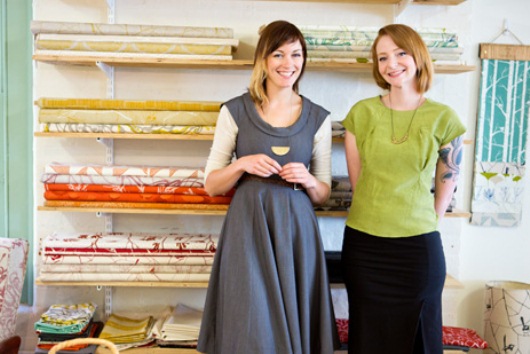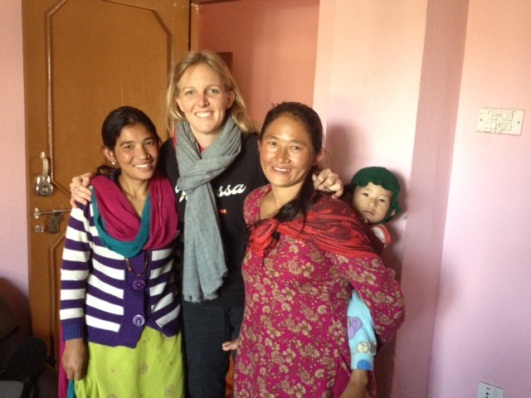Women in the World: A Study Tour to Nepal!
By Joanna Francis For our final Women in the World post for the year, we’re going on a little journey. A journey from an old factory in the Melbourne suburb of Kensington to the cities and remote villages of Nepal. Our travelling companion is Lara Cameron, a name that many of you will no doubt be familiar with. Lara is the co-founder of Ink & Spindle, the wonderful Melbourne boutique textile studio. Ink & Spindle produce beautiful screen printed textiles which are designed and printed by hand in an ethical and sustainable manner.
In a matter of weeks, Lara will be boarding a plane and heading to Neap to take part in a study tour run by Stephanie Woollard, founder of Seven Women, a not for profit organization that employs disadvantaged women to make handcrafted items that are sold in Australia. I asked both Lara and Stephanie about the trip and the organization and here’s a little of what they had to say:
"I first met Stephanie at a different fundraising event where I heard her speak about the upcoming trip. My first thought was that it was something that I definitely "should" do, but I was too intimidated by the prospect to apply - I knew it would involve stepping right out of my comfort zone!", says Lara.
"But, after thinking about it for a while, considering how great an opportunity it would be, I put forward my application and was accepted to join the group.
"At the very end of 2012 Steph is taking our group of 15 participants on a study tour of fair trade enterprises. We will be meeting some amazing people who are making a difference over there and also the people whose lives have been so positively changed by what Steph has created. Steph has established her own centre - the Seven Women Skills Training Centre where we'll be helping out for a few days with individual roles.
"I'm simultaneously excited and terrified about this trip. Having never been to a developing country before, this is going to be such an incredible, eye opening and challenging experience. Since sustainable and ethical practices are the foundation of everything that we do at Ink & Spindle, I'm really interested to see how what we see and learn over there can be applied to my own business. I am also excited about the fact that there are opportunities for me professionally as a designer to help Steph with what she is doing.
"Whilst in Nepal I'll be taking on a small product development role, assisting Steph in expanding her range with some products that I feel confident will be well received here in Australia. I've worked for many years in the local design/interiors/handmade industry and I feel that I have a good grasp on what products would be viable to produce and would sell successfully here. If all goes well these products will hopefully become a part of the core range and be produced on an ongoing basis, which will provide ongoing employment for the women involved in Seven Women. I'd also be open to assisting in the design process in future if my ideas prove to be helpful!"
After travelling to Nepal in 2005, Stephanie Woollard returned to Australia and felt compelled to help some of the most marginalised and disadvantaged women living in the capital, Kathmandu.
"I feel a moral responsibility to work with those less fortunate creating opportunities enabling them to improve theirs", Stephanie says. "When I met these women they had nothing. There was an opportunity for capacity building and empowerment. I envisaged these women enabling themselves to raise their standard of living by having someone to help them sell their handicrafts here in Australia. I paid for the initial training and worked on design with the women. When I came back to Australia we established a group at my university, La Trobe, to sell these products and raise awareness about Fair Trade. The group grew from three volunteers to over 15 passionate, committed students whose actions have a direct impact on the lives of the women in Nepal.
"The team of volunteers that has been created in Australia has done many markets around Victoria and the goods are now also stocked in several retailers and online. 100 per cent of the profits have gone back to the women in Nepal. This has enabled the tin shed to be knocked down and allowed a space for a women’s skills training centre to be built. It has grown from seven women to now, just over 120. The initial seven women now employ others without disabilities. This has challenged the stigma in society. Their hope is to be able to benefit the lives of other women who experience the same hardships they have endured.
"Women in Nepal have generally been subordinate to men in virtually every aspect of life. Nepal was a rigidly patriarchal society. Women's relative status, however, varied from one ethnic group to another. The senior female member played a commanding role within the family by controlling resources, making crucial planting and harvesting decisions, and determining the expenses and budget allocations. Yet women's lives remained centered on their traditional roles taking care of most household chores, fetching water and animal fodder, and doing farm work. Their standing in society was mostly contingent on their husbands' and parents' social and economic positions. They had limited access to markets, productive services, education, health care, and local government. Malnutrition and poverty hit women hardest.
"Female children usually were given less food than male children, especially when the family experienced food shortages. Women usually worked harder and longer than men. By contrast, women from high-class families had maids to take care of most household chores and other menial work and thus worked far less than men or women in lower socioeconomic groups. The economic contribution of women was substantial, but largely unnoticed because their traditional role was taken for granted. When employed, their wages normally were 25 percent less than those paid to men. In most rural areas, their employment outside the household generally was limited to planting, weeding, and harvesting. In urban areas, they were employed in domestic and traditional jobs, as well as in the government sector, mostly in low-level positions."
The work that Seven Women is doing is helping to slowly change this situation, by giving marginalized women opportunities that they didn’t previously have. Over 450 women have now been trained and are becoming self sufficient.
If you are interested in helping, you can visit the online store and buy some of the products made by the women. Alternatively, you can organize a fundraising event and book Stephanie to speak. If like Lara, you’d like to get a little closer, you can also join Steph on a study tour.
We’ll be catching up again with Lara in 2013 to hear about the trip and her ongoing involvement. Until then, wishing you all a lovely and uplifting New Year…
Joanna Francis spends most of her time hanging out with her 23 month old son. But she also works for a children’s foundation and has recently started her own little business making baby quilts. In the past, Joanna has worked as an aid worker in several developing countries, and is passionate about the rights of women and children. You can visit her and her blog at www.miettehandmade.com





